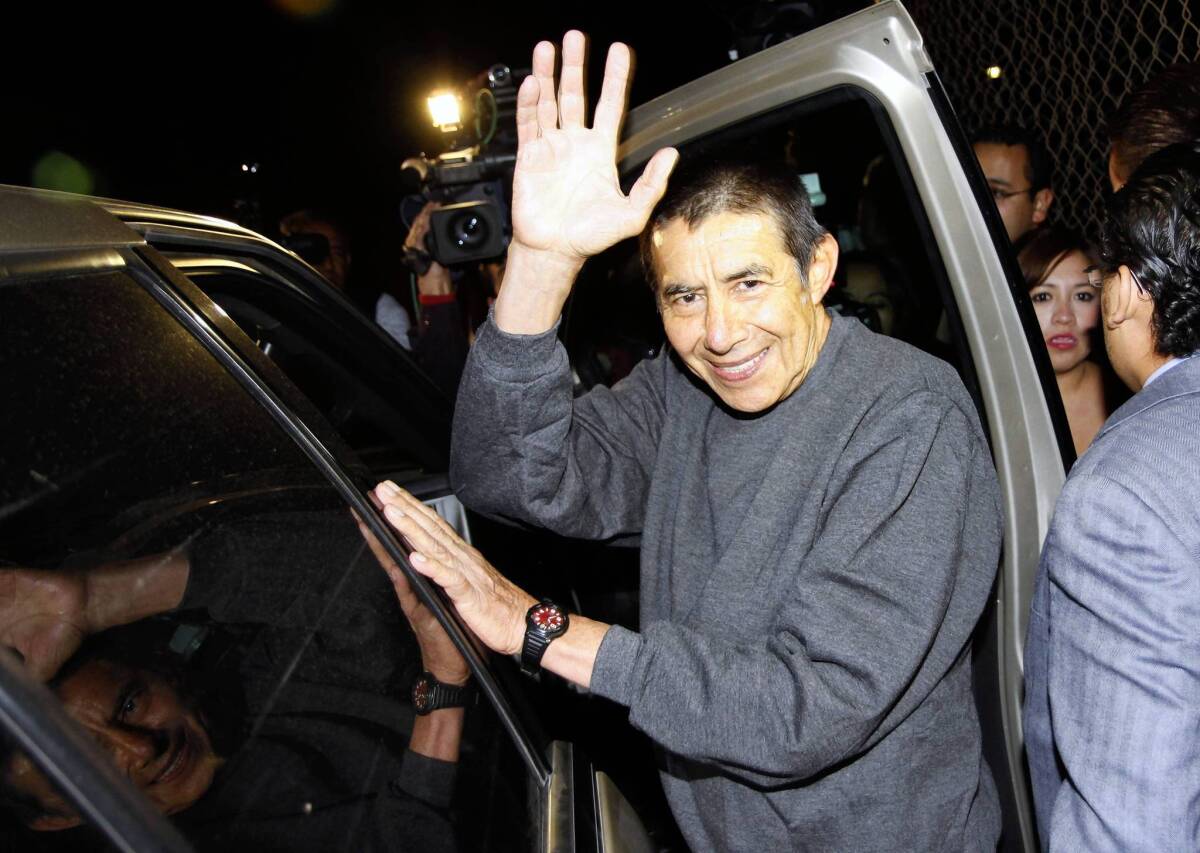Another domino in Mexico’s collapsing drug prosecutions

- Share via
MEXICO CITY — Gen. Tomas Angeles Dauahare, who once held the plum post of military attache to the Mexican Embassy in Washington, was rumored to be the next defense minister of Mexico.
Until that day in May last year when he and three other top military men were arrested on suspicion of working on behalf of a notorious drug cartel.
It was the largest indictment of army officers on charges of drug-trafficking in recent memory, hailed in many quarters as proof of then-President Felipe Calderon’s determination to root out corruption at every level.
But one night last week, Angeles stepped from the Altiplano maximum-security prison, all charges dropped.
The release of Angeles marked the second high-profile prosecution in as many days to be dismissed, raising questions about a series of Calderon-era cases that are collapsing like dominoes.
The failure to win convictions in major drug cases underscores the abysmal state of Mexico’s judicial system, stymied by corruption, antiquated procedures and incompetence.
But many Mexicans are also questioning whether the problem is bad prosecution, or something more sinister. Were cases mounted in the first place for reasons not of justice but political vendettas?
Angeles certainly thinks so.
“I always thought my problem was political, not criminal, and now the reality proves it,” the general told reporters after his release, as he profusely thanked the government of President Enrique Peña Nieto, which won election last year and took over in December from Calderon, of the conservative National Action Party.
Some have speculated that the Calderon government targeted the retired Angeles because he appeared to be close to rival Peña Nieto’s Institutional Revolutionary Party and had criticized Calderon’s military-heavy war against drug cartels.
Officials in the Calderon government denied political motivations when Angeles was arrested, along with two other generals, one of them also retired, and a lieutenant colonel.
The centerpiece of the case was testimony from secret informants, so-called protected witnesses, a relatively new and increasingly controversial mechanism being used as Mexico attempts to overhaul its judicial system.
The day before Angeles was freed, another case fell apart that also had been based on the testimony of an especially prolific protected witness, code-named Jennifer. That case involved Mexico’s former anti-drug czar, Noe Ramirez Mandujano, arrested in 2008 on suspicion of accepting $450,000 from the then-powerful Beltran Leyva cartel for information.
Ramirez, whose arrest was part of what the Calderon government touted ambitiously as Operation Cleanup, sat in prison for more than four years, until a judge exonerated him last week. Most other senior law enforcement officials similarly ensnared in Operation Cleanup have also been released.
Speaking to the Reforma newspaper, Ramirez bitterly complained that the Calderon government’s drug-war strategy, including its prosecution of alleged drug corruption, was a “farce [that] duped the Mexican people” into thinking they were seeing concrete results.
Atty. Gen. Jesus Murillo Karam said he has opened an investigation of the use of protected witnesses in the Angeles case, which he said relied disproportionately on a “rather discredited” informant who described “unlikely circumstances.”
Peña Nieto said the long series of collapsing cases should serve as a “clear lesson.”
“What we must do is professionalize, train and prepare the prosecutors and legal and police investigators,” he said.
That, of course, has been a longtime goal in Mexico, and the United States donated millions of dollars, through the so-called Merida program, to the Calderon administration to help improve policing and prosecuting. But progress has proved fleeting.
Angeles thinks the fallout from his case goes even deeper because of damage to the reputation of the army.
He had been the No. 2 in the Defense Ministry under Calderon and was the highest-ranking military man to be arrested on these kinds of charges since 1997, when Mexico’s drug czar at the time, Gen. Jose de Jesus Gutierrez Rebollo, was tried and convicted for allegedly protecting a leader of the Juarez cartel.
Though a respected institution in Mexico, the army has come under withering criticism for severe human rights abuses, including the killing of innocents and torture, during the last six years that it led the drug war. Secret U.S. diplomatic cables released by WikiLeaks also complained about the army being slow to act on intelligence and “risk-averse.”
But for now, it is the Mexican judicial system that is looking like the more broken institution.
The collapse of so many prosecutions “demonstrates the perversion of a system that instead of seeking justice, attempted to please a president,” commentator Sergio Sarmiento said. “The intense desire to show results opened the door to the greatest disappointment of an administration that might have deserved better luck.”
More to Read
Sign up for Essential California
The most important California stories and recommendations in your inbox every morning.
You may occasionally receive promotional content from the Los Angeles Times.









